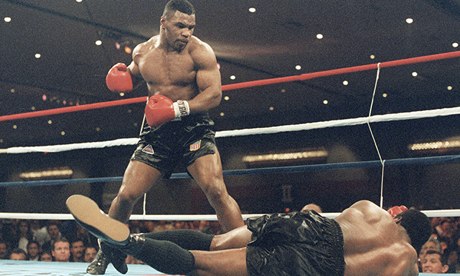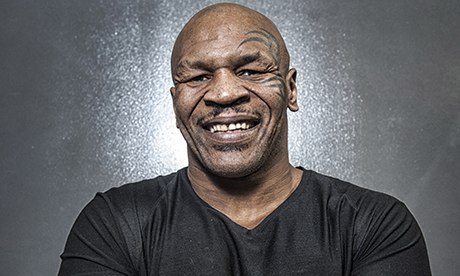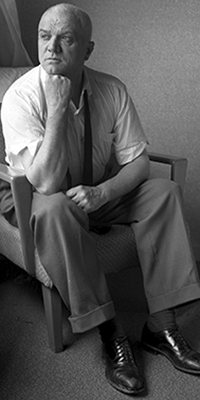
Photograph: Jacob Kepler for the Guardian
Mike Tyson: All I once knew was how to hurt people. I've surrendered now
The last great undisputed heavyweight champion of the world opens up about the pain of losing his daughter, drug addiction and his ongoing battle to escape the shackles of his violent past.
Mike Tyson: All I once knew was how to hurt people. I've surrendered now
Donald McRae in Las Vegas
The Guardian, Friday 24 January 2014
The last great undisputed heavyweight champion of the world opens up about the pain of losing his daughter, drug addiction and his ongoing battle to escape the shackles of his violent past.
After Muhammad Ali he remains the world's most recognisable boxer, and one of sport's most infamous characters. Yet Tyson looks most like a 47-year-old man trying hard to understand his tumultuous life.
He was once a frightened little boy, beaten often by his mother in a condemned building in Brownsville, Brooklyn, who turned himself into the self-proclaimed baddest man on the planet.
Tyson made and then lost almost a billion dollars as the last great undisputed heavyweight champion of the world whose controlled fury in the ring was eventually disfigured by madness and violence. He has had distressing problems with women, been to jail and then imprisoned even more tightly by alcohol and drug addiction.
Tyson has long been a masterful story-teller, with his obvious intelligence and street-hustling mentality producing a spellbinding raconteur ...
Tyson has a way of opening up now that allows the darkness to pour out of him without spreading the carnage that once trailed him wherever he went. He seems amazed he's still here, in one middle-aged piece.
Tyson admits in his relentlessly gripping autobiography, Undisputed Truth, that he is a cocaine addict whose recovery was hit by a relapse last summer.
"I was sober three years," he says now, "but I wasn't living a sober life. I know guys who don't take drugs for 20 years but they still don't live a sober life. They're bad, they're manipulative, they're not conscious of other people's feelings. A sober lifestyle needs a sober consciousness...."

Photograph: Jacob Kepler for the Guardian
Has Tyson worked out his own definition of happiness? "I look at it as just living healthily with a good moral sense. Having morality. You know any self-inventory I do tells me the same thing. I look back at the life I once had and see that I didn't have an emotional problem. I had a morality problem. I was without any morals."
Reading his book which, for all its sly humour and savage eloquence, is often harrowing, it's hard to shake the images of Tyson's mother, Lorna, and his mentor, Cus D'Amato, that rise from the page. Tyson relives one of his bleakest memories at the age of seven. "I was a pudgy kid, very shy, and I spoke with a lisp. The kids called me 'Little Fairy Boy'.
Tyson mentions his brother Rodney, five years older than him, who went into medicine and is a surgical assistant at a hospital in California. Tyson seems stunned by his brother's achievements. "I was used to living in a slum, in a condemned building. But my brother never talks about that. It must affect him."
How often does he see Rodney? "Not much. It's the really sad part about my family. We don't have a close connection. Too many demons, too much pain."
Tyson sounds neither self-pitying nor maudlin when he says: "My mother never believed in me. Even when I started doing well in boxing and people were writing about me she thought I was insane....
Cus D'Amato was a dark and complex figure. The sentimental version paints him as a saintly figure, a wise old trainer who rescued Tyson from juvenile prison and used boxing to instil discipline and purpose into his wayward life.
A giant painting of D'Amato stares down at us from the wall of Tyson's office. The previous day, Tyson had listened to an old recording of his trainer praising him but worrying, just before his death in 1985, that "he likes girls too much". ...
Tyson stresses that D'Amato made him more aware than anyone that he should be proud to be black – but he is troubled by other memories.

Cus D'Amato: 'There wasn't a happy muscle in his face.'
Photograph: New York Daily News Archive via Getty Images
"The only morality I knew was to win, to conquer, to be the best. Everything flowed from there. It made me think I should have this, or that girl should sleep with me. I was programmed that way. Can you believe this old man taught me these things? He must have been way out there.
"I watch some crazy clips of myself from back then and I can say that I probably wasn't sane for a period in my life."
Tyson learned about Nietzsche and Dostoevsky, Tolstoy and Napoleon, from D'Amato and Norman Mailer. "You can be an idiot and still learn something from those guys. You didn't need to go to school to get an education around Cus and Mailer. They talked about everything from such a high position. They never come down to laymen's terms. I learnt a lot and it's helped me through all the ups and downs."
"My wife gave me a perception of gratitude that I never had before. I was just a prima donna my whole life, thinking I deserved everything I got. But since then I've learned gratitude.
Tyson seems less crazy now than he has done for years. He's trying hard to stay straight and through his family, his one-man stage show, some acting, his book and his new company Iron Mike Promotions [IMP], Tyson has enough to sustain him.
Yet he is painfully honest about the perennial danger that he will fall again.
Tyson has lived a life which, as he says, has been "full of extreme highs and lows", and one in which, for all his faults, he has often been treated like a piece of money-making meat. What does he think of people today, having seen the best and the worst of so many – including himself? "Human beings are just a bad lot. Not everyone but the majority of people. Let's put it like this rather than in a collective sense. The people I invested the most time in disappointed me … "
Yet he stresses that his wife and Steve Lott, one of his oldest friends and now his assistant, are two of the exceptions who bolster him most. They are almost always with him as Tyson tries to turn IMP into a boxing powerhouse. Even if he continues to struggle for a promotional licence in some states, and he was barred from entering Britain last month because of his criminal record, Tyson appears determined to make his new life work.
"We're discussing this deal with Fox TV where we get 32 fights a year. Man, if that happens we'll be in the driving seat. It looks real good. This is the moment. The two shows we did recently superseded all the ratings ESPN had for their Friday night fights. But I never anticipated this thing being that difficult. Still, imagine if I was not Mike Tyson and how hard it would be then."
As the sun sinks across Nevada, Tyson shows me footage of his favourite old fighters. The office is empty but for me, Tyson and Lott and they dig out film of Panama Al Brown – the freakishly tall bantamweight of the 1920s and 1930s who supposedly had a tempestuous affair with Jean Cocteau.
Tyson has an encyclopedic knowledge of boxing, which is at its most irresistible when he zips from one great old fighter to another ...

Read More:
Source: http://www.theguardian.com/sport/2014/jan/24/mike-tyson-interview-pain-escape-violent-past
Mike Tyson, aged 20,
knocks out Trevor Berbick to become the youngest heavyweight world
champion in history. Photograph: Afp/AFP/Getty Images
No comments:
Post a Comment